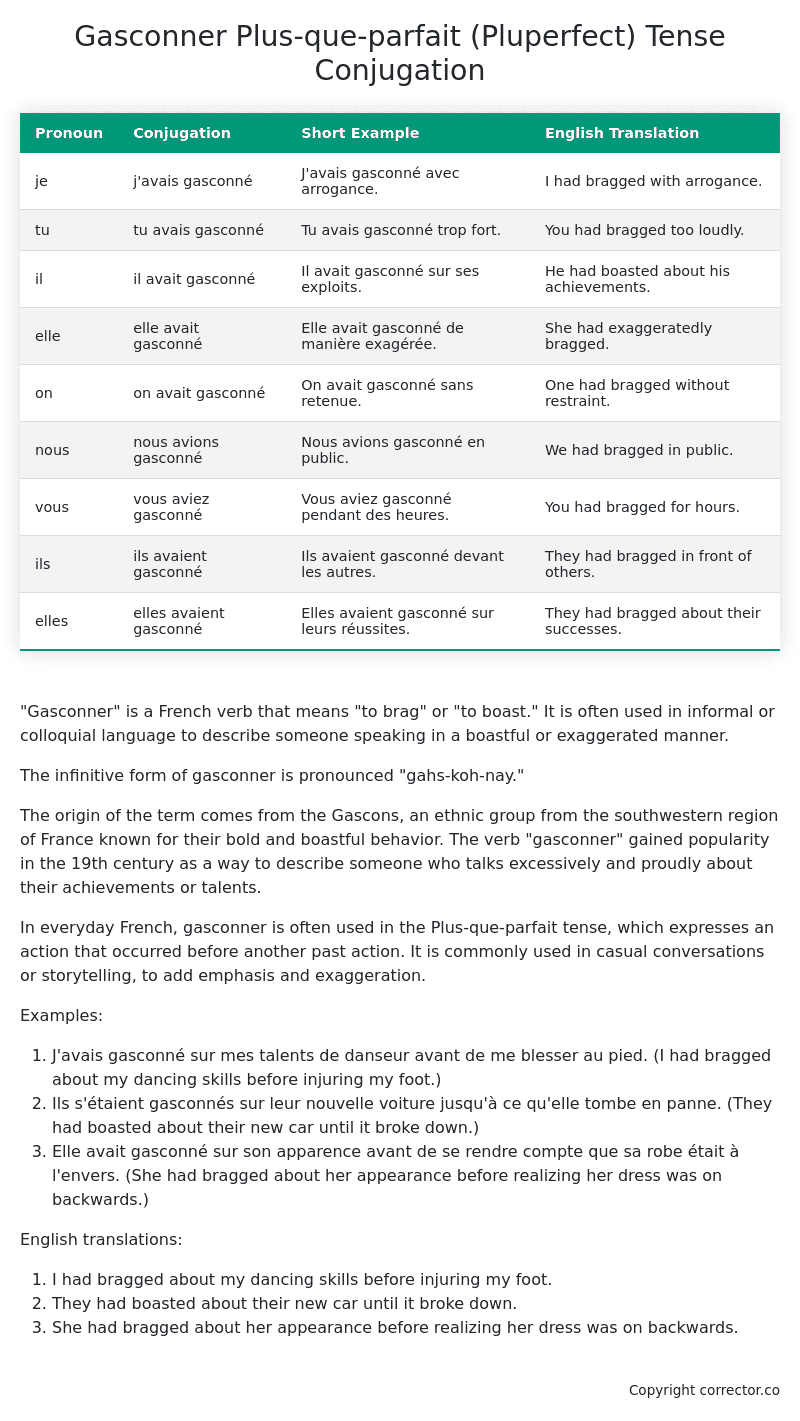Plus-que-parfait (Pluperfect) Tense Conjugation of the French Verb gasconner
Introduction to the verb gasconner
“Gasconner” is a French verb that means “to brag” or “to boast.” It is often used in informal or colloquial language to describe someone speaking in a boastful or exaggerated manner.
The infinitive form of gasconner is pronounced “gahs-koh-nay.”
The origin of the term comes from the Gascons, an ethnic group from the southwestern region of France known for their bold and boastful behavior. The verb “gasconner” gained popularity in the 19th century as a way to describe someone who talks excessively and proudly about their achievements or talents.
In everyday French, gasconner is often used in the Plus-que-parfait tense, which expresses an action that occurred before another past action. It is commonly used in casual conversations or storytelling, to add emphasis and exaggeration.
Examples:
- J’avais gasconné sur mes talents de danseur avant de me blesser au pied. (I had bragged about my dancing skills before injuring my foot.)
- Ils s’étaient gasconnés sur leur nouvelle voiture jusqu’à ce qu’elle tombe en panne. (They had boasted about their new car until it broke down.)
- Elle avait gasconné sur son apparence avant de se rendre compte que sa robe était à l’envers. (She had bragged about her appearance before realizing her dress was on backwards.)
English translations:
- I had bragged about my dancing skills before injuring my foot.
- They had boasted about their new car until it broke down.
- She had bragged about her appearance before realizing her dress was on backwards.
Table of the Plus-que-parfait (Pluperfect) Tense Conjugation of gasconner
| Pronoun | Conjugation | Short Example | English Translation |
|---|---|---|---|
| je | j’avais gasconné | J’avais gasconné avec arrogance. | I had bragged with arrogance. |
| tu | tu avais gasconné | Tu avais gasconné trop fort. | You had bragged too loudly. |
| il | il avait gasconné | Il avait gasconné sur ses exploits. | He had boasted about his achievements. |
| elle | elle avait gasconné | Elle avait gasconné de manière exagérée. | She had exaggeratedly bragged. |
| on | on avait gasconné | On avait gasconné sans retenue. | One had bragged without restraint. |
| nous | nous avions gasconné | Nous avions gasconné en public. | We had bragged in public. |
| vous | vous aviez gasconné | Vous aviez gasconné pendant des heures. | You had bragged for hours. |
| ils | ils avaient gasconné | Ils avaient gasconné devant les autres. | They had bragged in front of others. |
| elles | elles avaient gasconné | Elles avaient gasconné sur leurs réussites. | They had bragged about their successes. |
Other Conjugations for Gasconner.
Le Present (Present Tense) Conjugation of the French Verb gasconner
Imparfait (Imperfect) Tense Conjugation of the French Verb gasconner
Passé Simple (Simple Past) Tense Conjugation of the French Verb gasconner
Passé Composé (Present Perfect) Tense Conjugation of the French Verb gasconner
Futur Simple (Simple Future) Tense Conjugation of the French Verb gasconner
Futur Proche (Near Future) Tense Conjugation of the French Verb gasconner
Plus-que-parfait (Pluperfect) Tense Conjugation of the French Verb gasconner (this article)
Passé Antérieur (Past Anterior) Tense Conjugation of the French Verb gasconner
Futur Antérieur (Future Anterior) Tense Conjugation of the French Verb gasconner
Subjonctif Présent (Subjunctive Present) Tense Conjugation of the French Verb gasconner
Subjonctif Passé (Subjunctive Past) Tense Conjugation of the French Verb gasconner
Subjonctif Imparfait (Subjunctive Imperfect) Tense Conjugation of the French Verb gasconner
Subjonctif Plus-que-parfait (Subjunctive Pluperfect) Tense Conjugation of the French Verb gasconner
Conditionnel Présent (Conditional Present) Tense Conjugation of the French Verb gasconner
Conditionnel Passé (Conditional Past) Tense Conjugation of the French Verb gasconner
L’impératif Présent (Imperative Present) Tense Conjugation of the French Verb gasconner
L’infinitif Présent (Infinitive Present) Tense Conjugation of the French Verb gasconner
Struggling with French verbs or the language in general? Why not use our free French Grammar Checker – no registration required!
Get a FREE Download Study Sheet of this Conjugation 🔥
Simply right click the image below, click “save image” and get your free reference for the gasconner Plus-que-parfait tense conjugation!

Gasconner – About the French Plus-que-parfait (Pluperfect) Tense
Tense Formation
Common everyday usage patterns
Sequencing of past events
Background information
Hypothetical or reported speech
Interactions with other tenses
Summary
I hope you enjoyed this article on the verb gasconner. Still in a learning mood? Check out another TOTALLY random French verb conjugation!


